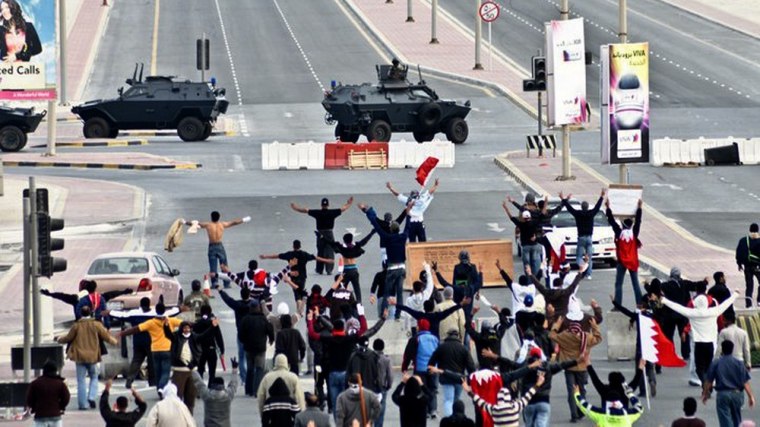The United Kingdom is training an elite Saudi security force that was sent to Bahrain to help quell recent pro-democracy protests, a British newspaper reported on Sunday.
The article in the Observer comes just days after British and other leaders said they backed "historic" revolts sweeping the Middle East.
The Ministry of Defence confirmed that British personnel run classes for the Saudi Arabian national guard in "weapons, fieldcraft and general military skills training, as well as incident handling, bomb disposal, search, public order and sniper training," the newspaper reported.
Around 1,200 Saudi Arabian National Guards were deployed to Bahrain during protests in March, according to the Observer. The country's Sunni royal family has been widely criticized for its harsh crackdown on largely Shiite protesters and the imposition of martial law.
The Ministry of Defence told the paper it had been training the elite cadre of soldiers — set up by the Saudi royal family because of fears that the army would not support it in an uprising — in "internal security and counter-terrorism" capabilities from 1964 to the present.
The Ministry of Defence also confirmed that it had been training the National Guard in "urban sharpshooter" programs.
The official statement came in response to questions made under the Freedom of Information Act, the Observer reported.
Promises to protesters Britain's Prime Minister on Wednesday pledged to throw his government's weight behind the pro-democracy moments in the region, saying that the changes in North Africa and the Arab world should be elevated "from a moment in history to a turning point in history."
"It is not a time for us to shrink back and think about our own issues and interests," David Cameron said during President Barack Obama's visit to Britain. "So the president and I are agreed we will stand with those who work for freedom."
Two days later both leaders joined the Group of Eight, which consists of the U.S., Canada, France, Germany, Italy, Russia, the U.K. and Japan, in promises to support new Arab democracies.
"We, members of the G-8, strongly support the aspirations of the Arab Spring as well as those of the Iranian people," according to a statement.
The statement said development banks could provide "over $20 billion" for Egypt and Tunisia — where the uprisings were successful — for 2011-2013 in support of "suitable reform efforts."
The groundswell of demand for change in the Arab world, which started in Tunisia, spread to Egypt and erupted in Yemen, Syria and Bahrain, has also left Libyan leader Moammar Gadhafi fighting to stay in power.
Buyers of weapons, training
Saudi Arabia is a major buyer of UK weapons as well as consultancy services. According to activist group Campaign Against Arms Trade, about 200 British Ministry of Defence employees and military personnel work in Saudi Arabia and the UK to support huge arms deals negotiated government-to-government.
The Observer report "is an indication of the intimate links that bind the United Kingdom and Saudi Arabia," spokeswoman Kaye Stearman told msnbc.com.
Britain's defense ministry responded to the Observer article by telling msnbc.com that the country provides "world-class" training to many countries throughout the world. These create "lasting ties between our armed forces and enhancing their ability to work together towards regional security and stability," the ministry said in a statement.
"The Gulf States are key partners in the fight against terrorism and the proliferation of nuclear weapons as well as being an emerging source of economic and political influence," the statement said.
The training will help "save lives and raise awareness of human rights," the statement concluded.
